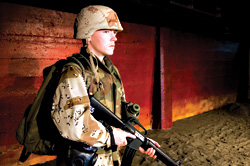Vincent Delaney’s Kuwait—a full-length play set amid the 1991 Gulf War which explores the insidious, incestuous bond between government and mass media—began as an award-winning 10-minute theatrical short. Of course, many a great work has sprung from a less-complete version of itself. Malcolm Lowry’s Under the Volcano comes to mind, an epic novel inspired by a short story the author had written years earlier. Lowry derived a tightly woven, intricately detailed universe from a mere fragment that somehow contained the blueprint of its own brilliant expansion—a single scene that became, in the end, just one part of the whole. The genetic material was there from the start.
Kuwait, on the other hand, reveals its growing pains at every step and never quite achieves the necessary unity of vision a truly great work requires. A sort of stylistic identity crisis pulls the play in competing directions: One minute, it seems headed toward absurdist satire, only to about-face into social realism and political tragedy. Its narrative gains momentum but never completely coheres, yet the sheer imaginative power and visceral indignation propelling this work more than make up for its shortcomings. Directed by Braden Abraham, Kuwait is a bumpy, uneven, but ultimately invigorating experience—a jarring journey into a fractured hell.
The story’s fragmentation, intentional or not, often works in the play’s favor—after all, this is war. Delaney’s episodic structure imparts an enervating sense of the chaos and uncertainty of a world riven by bloody conflict and littered with hidden land mines. Kuwait opens in an underground bunker, where brash, aggressive reporter Rachel (Kelly Kitchens) has been detained by Kelsey (David Hogan) for trespassing into territory forbidden to members of the media. Blindfolded and cussing up a storm, Rachel plays a sexualized game of good cop/bad cop with her soldier-captor, alternately flirting and hurling abuse in an attempt to figure out what’s happening to her. At first, Kelsey appears only a cipher, a tight-lipped grunt who, it turns out, is hiding a horrible secret. Kitchens and Hogan are both excellent. They develop an intensely intimate dynamic as they travel, both literally and figuratively, toward a moment of breathtaking devastation.
Alternating with these scenes are depictions of press conferences and briefings where Catherine (Rebecca Olson)—an ambitious yet naive, almost ditzy, reporter—receives advice and caveats from the perfunctorily wry Martha (Terri Weagant), a military press liaison whose blunt realism teeters toward outright cynicism. This is the funnier, more satirical of the two story lines, and Olson and Weagant play off each other well. The shift between these two linked scenarios doesn’t always produce the frisson intended. In the end, their connection feels forced, an unnecessary subplot. The emotional and psychological tenor of the two stories don’t quite jibe. Nonetheless, Kuwait‘s relentless progress sweeps both plotlines along, and a certain breathless panic—a by-product of pervasive violence—produces its own undeniable logic. It is not ours to question how or why, but to do or die.
Delaney’s writing is both muscular and inquisitive, as though his outrage at the state of the world and the war’s course keeps him hurriedly circling back, scavenging for clues in this mad rush to destruction. The results of this narrative reconnaissance are akin to that of Tim O’Brien’s excellent Vietnam short-story collection, The Things They Carried, a book in which every narrator is unreliable and circumstantial truth is a crapshoot for life and death. Abraham does an ace job balancing the chaos and the shaggy-dog aspects of Delaney’s script, and the cast provides a deep sense of character within the whiplash pacing. Despite the heaps of sand onstage, the set is a nicely minimalist affair; an uptipped table may double as a defilade. And be warned: At times, the sound is deafening. In all, the production does a credible job of creating a sense of disorientation and disorder without losing the play’s narrative threads. If those threads are frayed, it’s for good reason: This is an ambitious work, a furious attempt to shine a light on the powers that collude and corrupt in the process of bringing war—the big show—to a mass audience. Kuwait is not a perfect play, but it is an important one.








